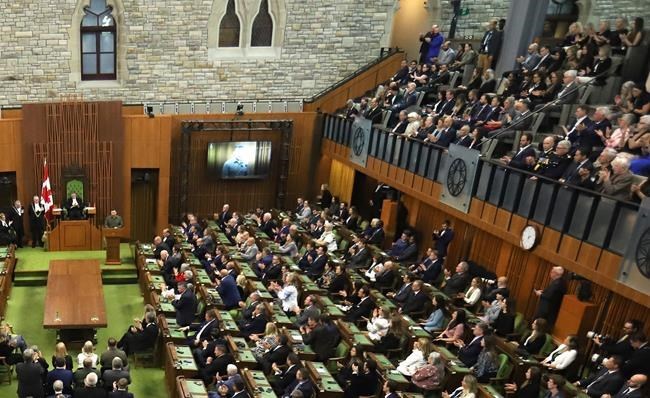OTTAWA — A federal government unit tasked with keeping war criminals out of Canada has not published a report on its activities in more than eight years, and its budget hasn't been adjusted in more than two decades.
The War Crimes Program has a mandate to prevent Canada from becoming a safe haven for people accused of committing atrocities including genocide and crimes against humanity.
It is a joint effort by the departments of justice and immigration, the RCMP and the Canada Border Services Agency.
Between the program's launch in 1998 and 2008, it reported annually on its activities, documenting hundreds of cases in which suspected war criminals were investigated, along with the results of those probes.
It has produced only two reports since then, and none since 2015. When asked about the missing data, a spokesman did not provide a reason for the lack of reports.
"The War Crimes Program is currently working to modernize its public reporting practices collecting data from 2016 to present with a view to updating the website," Ian McLeod said in an email.
He also said the annual budget is $15.6 million. That is the same allocation the program received annually between 1998 and 2015, according to the reports that were published.
David Matas, a senior lawyer for B'nai Brith Canada, said the lack of reporting is a problem.
But he said it's not overly surprising because the program has also suffered from a lack of funding.
"It's a sorry story," Matas said in an interview. "They don't have much to report. Or you could say that in light of the underfunding, things haven't changed that much."
The program arose about 11 years after a report from the Deschênes Commission on war criminals.
The commission was launched in 1985 following the publication of newspaper stories in Canada and the United States that notorious Nazi doctor Josef Mengele had applied for landed immigrant status in Canada.
While it eventually concluded that Mengele had not sought entry to Canada, it found evidence that hundreds of former Nazis may be living in Canada and recommended further investigations.
At first, both the Justice Department and the RCMP created special sections to deal with war crimes, but in 1998 the actual War Crimes Program itself was launched, bringing the Immigration Department into the mix. The Canada Border Services Agency joined in 2003.
The program had two different streams, including one dealing with Second World War cases and one for what it deemed "modern day" cases, or events that occurred later.
The available reports show that as of 2008, Canada had investigated more than 1,800 cases related to the Second World War, and 28 resulted in some kind of action, including attempts to prosecute, revoke citizenship or deport.
Most of those people died before the cases concluded, but citizenship was revoked in five cases, two people were deported and two left voluntarily.
As of 2007, the War Crimes Program had reviewed more than 33,000 cases involving the "modern day" war crimes allegations, including people trying to come to Canada and those already here.
The program said it had prevented the entry of 3,721 people, denied asylum claims to nearly 600 people and deported 443.
Canada's efforts to expel or prosecute war criminals have been under increased scrutiny since Parliament applauded a man last September who was later identified as having fought with a Nazi unit in Ukraine during the Second World War.
That scrutiny included renewed calls for the government to fully release all the pages from both the Deschênes report and what's known as the Rodal report, a historical accounting of war criminals in Canada written for the Deschênes commission by historian Alti Rodal.
Both reports have been released in bits and pieces over the last three decades, including 15 new pages of the Rodal report unredacted by Immigration Minister Marc Miller earlier this month.
Matas, who has pushed for the release of the full reports for years, said Canada must learn what it did wrong before to prevent history from repeating itself.
The country still has a problem admitting accused war criminals, he said, and one of the reasons why is "we haven't been releasing this."
Miller told The Canadian Press last week that because Canada has no official declassification regime governing how historical records are declassified and released publicly, he has to review the reports and decide what gets released on an ad hoc basis.
"The decision is in my hands," he said.
He said he has asked the War Crimes Program to look at what filter has been applied to each report to date, which elements still haven't been released and what legal interests must still be protected.
But he said releasing the list of names of people accused of war crimes in the Deschênes report is tricky because doing so could be harmful to the accused's families.
"This is a consideration that should not be exaggerated or minimized, but is there a protection of people that have passed and their families, who would have aspersions cast upon them?" said Miller.
"And they would be carrying the sins of their, presumably, fathers that may or may not have committed war crimes. And so that is a very sensitive consideration that we have to look at."
Matas said that's not how Canada's justice system works.
"Publicity is the soul of justice," he said.
"When the courts are open, justice itself is on trial. The notion that we should have courts closed because it might embarrass relatives or descendants of the people on trial is preposterous."
This report by The Canadian Press was first published Feb. 21, 2024.
Mia Rabson, The Canadian Press




